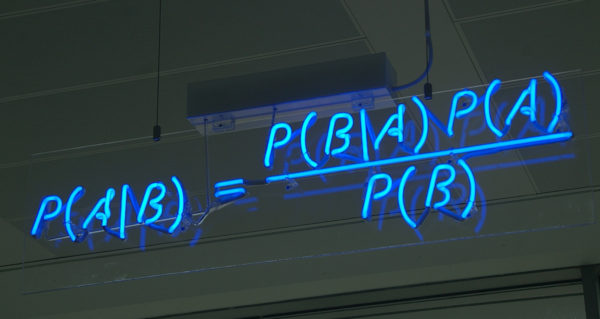The Power and Danger of Bayes’ Theorem
by Brandon Vogt
Filed under Christianity and Science, The Existence of God

I've noted many flaws and points of confusion in Sean Carroll's new book, The Big Picture: On the Origins of Life, Meaning, and the Universe Itself (Dutton, 2016), but one of the strongest sections is its explanation of Bayes' Theorem. The Theorem is a quantitive way to express confidence in certain beliefs. It requires assigning credences (or probabilities) to events or statements, and then tweaking them based on new information.
For example, suppose you're wondering whether a randomly flipped coin will turn up heads. Your prior credence (or initial probability) is 0.5, since it has a 50% chance of landing on heads. But then suppose you learn that the coin is rigged, and there's extra weight added to one side. That new information would naturally cause you to adjust your credence, either up or down depending on the information.
This all should be pretty familiar. Whether we realize it or not, we all use this process, sometimes called induction, to make decisions every day. We start with beliefs, take in new information, and (ideally) adjust those beliefs to better correspond with reality. Bayes' Theorem simply adds a more quantitative dimension to that calculation. Instead of using mere intuition to adjust our credences up or down in light of new information, Bayes uses hard statistics.
According to Carroll, we can learn three lessons from Bayes' Theorem:
- Never assign perfect certainty to any belief (i.e., no belief can have a credence of 1.0)
- Always be prepared to update our credences when new evidence comes along
- Trust mathematics to show how new evidence alters our existing beliefs
Carroll especially shines when explaining how a piece of new information can either boost our confidence up, or bring it down—but it can't do both. For instance, many atheists claim the problem of evil should reduce the probability of whether God exists. But many theists suggest that the problem of evil is actually evidence for God, since an objective moral standard depends on a divine lawgiver. We may be tempted to accept both proposals: the problem of evil brings the probability of God down a little, and it also raises the probability back up. But as Carroll explains, the Theorem doesn't allow that. Each new piece of information can either raise or lower our prior credences. It can't do both.
(Another example is the huge size of the universe. Atheists often point to that in arguments against God, or at least against the idea that humans occupy a special place in the cosmos. Typically, theists respond that God designed a vast universe because (1) it was the only physical way to provide a space hospitable for human life, (2) God is not limited in any way so efficiency is not a concern, and (3) since almost all people marvel at the scale of the cosmos, and wonder is good, God created a large universe as a gift for us to experience and explore—the same reason we prefer a wondrous mountain over a plain pebble. But in light of Bayes' Theorem, the theist can only use those arguments to support their belief in God if they can show they are more likely true than not, that God would do those things if he existed. If the theist cannot or will not make that case, then the best they can hope for is mitigating how much the "large universe" argument bends the probability of God toward atheism.)
On paper, Bayes' Theorem is very helpful, and Carroll admirably shows why. But my one complaint with his presentation in the book is that he skirts around some of its main criticisms. For example, the Bayes calculation depends entirely on the accuracy of the credences. Assigning credences is easy for things like rolling idealized dice, flipping idealized coins, or dealing an idealized deck of cards. But what about more complex things? What's the prior probability of the existence of God? How probable is evil given God's existence? What's the statistical probability of a miracle given certain background information?
In non-idealized scenarios, which pretty much means all of everyday life, it's extremely difficult to assign accurate credences. It's often just a subjective shot in the dark. Carroll admits this, writing, "Some people don't like Bayesian emphasis on priors, because they seem subjective rather than objective. And that's right—they are. It can't be helped; we have to start somewhere" (80). His hope, however, is that Bayes offers a sort of course correction because new credences—what Bayes followers call "consequent probabilities"—will make up for imprecise prior credences. However, this leads to a major problem. If the prior credences are subjective and imprecise, then introducing new subjective, imprecise credences will not solve the problem—it will only compound it.
Throughout the rest of his book, Carroll regularly suggests that Bayesian reasoning supports his poetic naturalism, or components of it. But he almost never shows us the actual Bayesian calculations, with specific credences than can be examined and challenged.
In one of the rare places where he does provide actual credences, the chapter titled "Abducting God," Carroll applies Bayes' Theorem to God's existence. He assigns a prior credence of 50%. In other words, without considering any background evidence, we can initially assume that God's existence is as equally likely as not. That's not a bad starting point. But the rest of the chapter is filled with Carroll's wild presumptions about what the world would or would not like, given God's existence, and how the Bayes calculation should be updated. For example, he argues that the existence of evil, the massive size of the universe, and the lack of consensus about God all bring that 50% confidence level way down. Why? And by how much? It's tough to discern from his book since he provides no specific credences for his views, nor does he defend his belief that certain events would be more likely, given God, than not. He just throws around terms like "more likely" and "less likely" as if they were consensus views we all accept.
The chapter in question offers a perfect case study of how Bayes' Theorem can be both powerful and dangerous. Like a table saw, it can be very useful in certain tasks, but wildly destructive in the hands of a sloppy worker (note: I'm not necessarily suggesting Carroll is sloppy; this is just a general remark about Bayes' Theorem.)
The Theorem's effectiveness depends completely on the accuracy of the credences you put into it. And if we can't agree on the credences—or if, like Carroll, you refuse to even identify specific credences, much less defend them—then the output is irrelevant at best, and dangerously misleading at worst. On paper, Bayes' Theorem is a fantastic way to apprehend truth; in practice, it often has the opposite effect.
In the next post, we'll explore Carroll's answer to another fundamental question: why does the universe exist?
Related Posts
Note: Our goal is to cultivate serious and respectful dialogue. While it's OK to disagree—even encouraged!—any snarky, offensive, or off-topic comments will be deleted. Before commenting please read the Commenting Rules and Tips. If you're having trouble commenting, read the Commenting Instructions.












